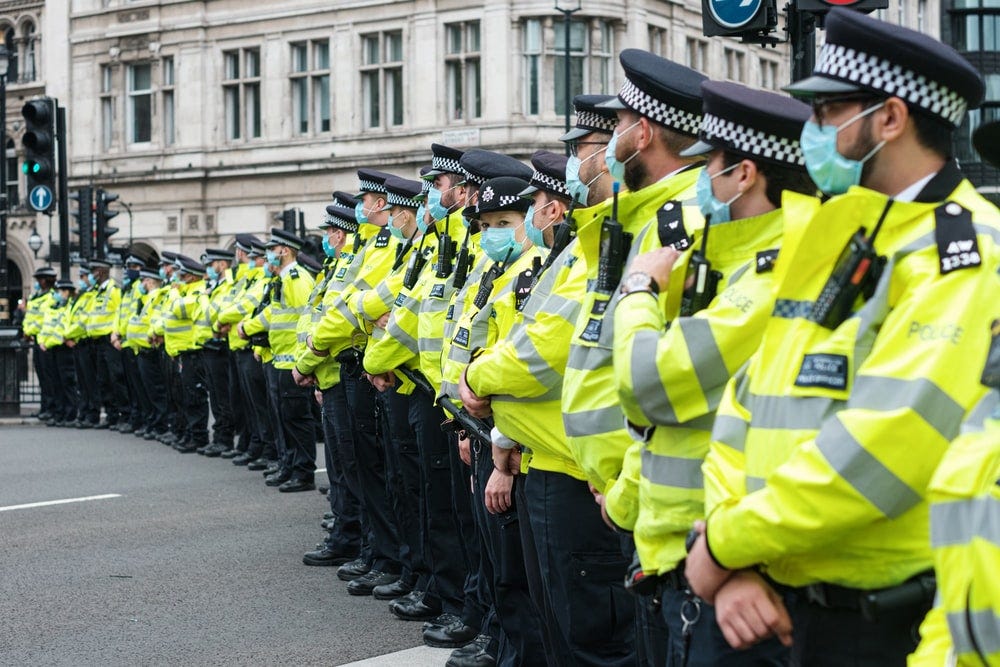Arjun Singh Lotay: UK Sikhs Will Fight Priti Patel's Bill To Expand Police Powers
The PCSC bill will have damning impacts on our fundamental rights to protest, especially at a time when direct action is needed more than ever.
Arjun Singh Lotay
April 30, 2021 | 3 min. read
On March 9, UK Home Secretary Priti Patel proposed the Police, Crime, Sentencing and Courts Bill (PCSC) aiming to expand police powers. In response, protests employing the slogan “Kill the Bill” have taken place across the UK. Tensions remain high while the bill makes its way through Parliament, and concern among UK Sikhs is rising too.
This bill, according to the government, will “allow the police to take a more proactive approach in managing highly disruptive protests'' and there are fears this would impact Sikhs who take to protest for domestic and international issues. Sikh Council UK, Sikh Youth UK, and many more Sikh organisations have publicly condemned the bill.
The new bill aims to add to existing legislation, allowing police to use powers usually reserved for large-scale marches, on smaller, static protests. This also allows police to shut down demonstrations to minimise “impact” and set noise levels, alongside making ‘public nuisance’ laws a statutory offence - placing a ten-year sentence on people who are deemed to cause “annoyance”. These new terms are deliberately ambiguous and set a dangerous precedent on the right to free expression, especially as these will be determined on a case-by-case basis by the Home Office. The government also plans to extend this to single person demonstrations.
Critics have argued these changes mark a pattern of the UK government's draconian lawmaking. The bill permits the prosecution of protesters who have “ought” to have known their actions were unlawful - previously this needed proving in court. There has also been criticism from Gypsy, Roma, and Traveller (GRT) communities, who argue that this bill targets nomadic communities such as theirs and opens them up to police harassment.
There are deep concerns about the government’s priorities - especially when it comes to the right to protest. Home Secretary Priti Patel has ties to RSS-linked groups, and the BJP has openly fraternised with the Conservative party. There are also fears that this new legislation will have implications on the policing of the annual 1984 memorial rally in Trafalgar Square, as well as Nagar Kirtans.
Protests against the bill have occurred across the country, with Bristol being a focal point. Protesters in the city were continuously met with a heavy-handed response from the police, including the assault and arrests of journalists and legal observers. Similar scenes at a vigil for Sarah Everard also went viral.
There are very real implications that this bill will have on UK Sikhs’ ability to mobilise and organise. Whether in the anti-colonial or anti-racist struggles of the early 20th Century, or the Kisaan Majdoor Ekta movement taking place today, it is important that we fight for the liberation of the downtrodden and marginalised; it is equally important that we stand up when that ability to fight is being threatened by the state.
The police have already employed heavy-handed tactics against Sikh activists in the past. Protests took place outside London’s Indian High Commission in 2015 demanding the release of Sikh political prisoners and in outrage over the desecration of Sri Guru Granth Sahib in Punjab. According to eyewitnesses and reports, mounted riot police charged at a peaceful sit-in protest. Activists also had their kirpans and dastaars forcibly removed by officers, children were arrested, and Nishaan Sahibs were thrown to the floor - which the Metropolitan police subsequently apologised for.
Similarly, in December 2020, when thousands took to London in solidarity with the Kisaan Majdoor Ekta movement, the Metropolitan Police remained committed to “appropriate action”, and a “robust policing plan.” Similar statements on curbing the rights of Sikhs to protest have come from Conservative mayoral candidate Shaun Bailey in a recent meeting with the Indian High Commissioner - which he has since backtracked from.
As this publication has shown, the UK Foreign Secretary is keen to overlook human rights abuses in exchange for trade deals. British Sikh activists have already been on the receiving end of this: Jagtar Singh Johal has been held in an Indian prison for over 3 years, the raids of Sikh activists in 2018 raised questions of alleged collusion between Punjab and West Midlands Police, and recently, three Sikhs in the West Midlands were arrested and face extradition to India. This also comes as the West Midlands Police released a statement warning against supposed “Sikh separatists” posing a threat to the region - this claim has been openly debunked and refuted, and worryingly mirrors rhetoric touted by Indian media sources.
With this in mind, it is clear that the PCSC bill will have damning impacts on our fundamental rights to protest, especially at a time when direct action is needed more than ever. Its aim to widen powers that are already deployed disproportionately is worrying. For Sikhs in the UK, we must join the fight to Kill the Bill.
Arjun Singh Lotay hails from East London. He is currently a Politics and Sociology student at the University of Cambridge. You can find him on Twitter at @ArjunSinghL.
Baaz is home to opinions, ideas, and original reporting for the Sikh and Punjabi diaspora. Support us by subscribing. Find us on Twitter, Instagram, and Facebook at @BaazNewsOrg. If you would like to submit a written piece for consideration please email us at editor@baaznews.org.




